- Home
- James Carol
Broken Dolls (A Jefferson Winter Thriller) Page 2
Broken Dolls (A Jefferson Winter Thriller) Read online
Page 2
These day I’m more relaxed about my appearance. The starched white shirts and stiff suits have gone, replaced with jeans and dead-rock-star T-shirts and hooded tops. The shiny shoes have been swapped for comfortable, scuffed working boots. The dye ended up in the trash. I might not look as smart as I used to, but I felt a damn sight more comfortable. Those G-Men suits were like straitjackets.
‘What are your first impressions?’ Hatcher glanced over at me, one hand on the wheel, the needle pushing a hundred.
‘There are only two ways this guy’s going to stop. You catch him or he dies. Either from causes natural or unnatural. He likes what he does too much to stop on his own.’
‘Come on, Winter, this isn’t some rookie you’re talking to here. That description covers ninety-nine point nine per cent of serial criminals.’
I laughed. Hatcher had got me there. ‘Okay, how about this? When you catch him, he’s not going to come in easily. This one’s a prime candidate for suicide by cop.’
‘What makes you say that?’
‘Prison would kill him.’
‘Why?’
‘This guy’s all about control. He controls every aspect of his victims’ lives. What they wear, what they eat, everything. He couldn’t handle having that control taken away. Suicide by cop would appeal to him because he would be choosing the time and place of his death. In his mind, he’d still be in control.’
‘Let’s hope you’re wrong about that.’
‘I’m not.’
While Hatcher drove, I went over the details of Patricia Maynard’s kidnapping in my head. I would have liked more information, but that’s nothing new. It doesn’t matter how much information you’ve got, it’s never enough.
According to the police reports, Martin Maynard had reported his wife missing on August twenty-third, and in doing so made himself the prime suspect. Most murders are committed by someone known to the victim. A spouse, a relative, a friend. At that point, this wasn’t a murder investigation, but the cops were covering their bases.
Martin Maynard had had a string of affairs and the couple had been seeing a therapist in a last-ditch attempt to save a marriage that should have been signed off as terminal a long time ago. Add in a sizeable life insurance policy and there was plenty of motive. Murder was the logical conclusion.
After forty-eight hours of questions Martin Maynard was free to go. The cops kept an eye on him over the intervening months, but again, this was more about covering bases, and asses. When the cops assembled the puzzle pieces of Patricia Maynard’s last movements, they established that she had gone missing some time during the evening of August twenty-second.
Martin’s alibi was rock-solid and came in the form of his secretary, a woman he’d sworn to Patricia he was no longer seeing. On the night she disappeared he was supposed to be in Cardiff on business, but was actually still in London with his secretary. Hotel records and eyewitness accounts backed up his story.
For the next three and a half months, nothing. No ransom note, no telephone demands, no body. Patricia Maynard had disappeared off the face of the planet. Everyone assumed she was dead, then, two nights ago, she turned up in a park in St Albans, a small cathedral city situated thirty minutes north of London. She was disorientated and non-communicative, unable to answer even the most basic questions. Graham Johnson had been walking his dog, and found her wandering alone. He called in the local police, and they quickly identified their Jane Doe as Patricia Maynard. She was transferred to St Barts Hospital in London and Hatcher took over the case.
During her three and a half months in captivity, Patricia Maynard had been repeatedly tortured. Her body was covered in scars and bruising, some old, some new. This unsub liked to play with knives, and the tox screen showed that he used drugs to keep Patricia awake and hypersensitive while he had his fun. He had cut her fingers off one at a time, all except the ring finger on her left hand. The stumps were neatly cauterised. Curiously, he had avoided damaging her face, and even more curiously, there were traces of make-up that hadn’t been properly wiped off. Another interesting point: aside from her injuries, Patricia was in pretty good shape. Her weight was appropriate for her height and build, and there were no signs of dehydration.
We reached the turn for St Albans and Hatcher hit the indicator and swerved left onto the off-ramp. Five minutes later we were driving through St Michael’s, a part of the city made up of rickety terraces of little picture-postcard houses and larger properties that must have cost a small fortune. We drove past four bars. Too many for the number of houses, not to mention the demographic those houses represented. The area had tourist written all over it.
The cold hit me the second I got out the car. It was like charging head-first into a wall of solid ice. I was wearing my thickest jacket. Sheepskin on the inside to keep in the warmth, and waterproofed suede on the outside to keep out the worst of the wind and the wet. I could have been wearing shorts and a T-shirt for all the good it was doing. I lit a cigarette and Hatcher gave me a dirty look.
‘We’re outside,’ I said. ‘I’m not breaking any laws.’
‘Those things will kill you.’
‘So will a lot of things. I could get hit by a bus tomorrow.’
‘Or you could get diagnosed with lung cancer and die a slow, lingering, painful death.’
I flashed Hatcher a tight grin. ‘Or maybe not. My great-grandpa smoked two packs a day and lived to be a hundred and three. Let’s hope I take after him, eh?’
Graham Johnson’s house was opposite the Six Bells. Like all the other houses along this stretch the front door opened directly onto the sidewalk. One of Hatcher’s people had phoned ahead, so Johnson was expecting us. The living-room curtain fluttered down as we walked up to the house, and the door swung open before Hatcher had a chance to hit the bell. Johnson stood in the doorway, a Jack Russell yapping and bouncing hyperactively around his ankles. He was average height, average build, and his head brushed the top of the low doorframe.
According to the police reports, Johnson was seventy-five, and every single one of those years was etched into the lines that creased his worn, worried face. What little hair he had left was as white as mine and there were large bags under his rheumy blue eyes. He moved fluidly for his age, though, no stiffness despite the fact it was thirty degrees outside. Regular exercise rather than vitamins and joint supplements. Johnson didn’t strike me as someone who would go down the vitamin route.
‘Come on in.’
Johnson stepped aside to let us into the living room. The dog was going nuts, yapping and twirling and chasing his tail. The old guy shouted a sharp ‘Barnaby, quiet!’ and the dog shut up and bounced onto a chair, a guilty look on its face. I crushed my half-smoked cigarette out on the sidewalk and followed Hatcher inside. The dog’s eyes followed us across the room. Johnson ushered us towards the sofa and we sat down. The small fire burning in the grate warmed the room and cast a cosy orange glow.
‘Can I get you anything?’ he asked. ‘Tea? Coffee?’
‘A coffee would be great,’ I said. ‘Black, two sugars, thanks.’
Hatcher declined, and the old guy disappeared into the kitchen. I settled back on the sofa and checked out the room. My initial impression was that it was preserved like a museum exhibit. I’d noticed Johnson’s wedding ring when he answered the door, and I’d also noticed that the living room had been decorated by a woman. What I hadn’t noticed was a wife.
There were dusty ornaments on every spare surface, faded floral cushions on the chairs and sofas, faded floral curtains at the windows. An ancient framed wedding photograph had pride of place on the mantelpiece, and there were family photos everywhere, lots of smiling kids and grandkids. The hairstyles and clothes dated the photographs, with the most recent being about four years old. That’s when Johnson’s wife must have passed away.
Johnson came back with two steaming mugs of coffee, handed me one, then settled down in the chair next to the fireplace. My coffee was strong and packe
d with caffeine. Just how I liked it.
‘Can you tell us how you found Patricia Maynard?’ Hatcher asked.
‘That was her name then,’ he said. ‘You know, I must have spoken to a dozen policemen since Monday night and no one bothered to tell me her name. Then again, I didn’t ask, so I guess it’s my fault as much as theirs. It doesn’t seem right, though. Not finding out what she was called.’
‘Mr Johnson,’ said Hatcher.
The old guy snapped back into the here and now with a visible start. ‘Sorry,’ he said.
Hatcher waved the apology away. ‘Can you tell us what happened?’
‘I was taking Barnaby out for his late-night walk. This would have been about ten. I take him out the same time every night. I actually take him out to the park two or three times a day. If I didn’t he’d wreck the house.’
‘This was to Verulamium Park, right?’
‘That’s right. Verulamium Park. You probably passed the entrance on the way here. Anyway I got to the end of the lake and that’s when I saw the woman. The reason I noticed her was because I thought she was about to go into the water.’ He stopped and drank some coffee. ‘Look, I don’t mean to be rude but I’ve already told the police all this. I don’t mind going over it all again, but I can’t help feeling I’m wasting your time.’
‘You’re not wasting our time.’ I glanced over at the Jack Russell. ‘I’d like to try something if you’re up for it. Do you think Barnaby would like to go for a walk?’
The dog’s ears pricked up when he heard the word ‘walk’. He jumped off his chair and started barking and twirling, pirouetting like a circus dog. Johnson laughed. ‘I think you can take that as a yes,’ he said.
3
It took us five minutes to walk to Verulamium Park, long enough to smoke a cigarette from tip to butt. Barnaby bounced all the way there, straining on his lead, half choking himself to death, and acting like this was the most exciting thing ever. Dark was descending fast and the streetlamps glowed a sickly sulphurous yellowy-orange in the heavy half-light. The snow wasn’t far off and the air had a choking damp feel. I pulled my jacket in tighter to ward off the chill but it didn’t help. The cold of a damp British winter day could penetrate an arctic suit.
‘Do you do the same walk every time?’ I asked Graham Johnson.
The old guy shook his head. ‘We’ve got a number of routes we take. It depends on the weather, how much time we’ve got, that sort of thing. It’s a big park.’
It was a big park. Off to the right, acres of grassland stretched as far as I could see, empty soccer fields marked out white on grey. The cathedral was off to the left, perched imposingly on a distant hill. Up ahead was a small lake that was separated from the main lake by a humpback bridge. Ducks and swans bobbed on the water, oblivious to the cold.
It was also dark and deserted, making it the perfect place for the unsub to dump Patricia Maynard.
‘The night you found Patricia Maynard, which way did you go?’
Johnson pointed towards the cathedral side of the main lake. ‘We did a quick anticlockwise walk around the lake.’
‘And where did you see Patricia Maynard?’
The old guy pointed to the far end of the lake.
‘Okay, let’s go.’
It took another five minutes to walk there. I got Johnson to sit down on an empty bench, then sat beside him. Barnaby was straining on the end of his lead, yapping and scratching at the concrete, desperate to get free so he could catch a duck. I glanced up at Hatcher, who quickly got the message. For this to work, the fewer distractions Johnson had the better. Hatcher took hold of Barnaby’s lead and walked out of earshot.
A cognitive interview differs from a standard interview in that you’re trying to get the subject to revisit the scene by reliving the feelings and impressions that were imprinted at the time. Rather than hitting the event head-on, you circle around it, looking at it through the different senses. The memories this evokes have been found to be much more reliable than those retrieved through the usual interview techniques. Strictly speaking, I didn’t need to bring Johnson back here, but since we were just around the corner I didn’t see the harm.
‘I want you to close your eyes, Mr Johnson, and then I’m going to ask you some questions. Try not to censor your answers. I don’t care how crazy they might seem, just say whatever comes into your head.’
Johnson looked at me sceptically.
‘It’s okay. I’ve done this before.’
Johnson gave another sceptical look then shut his eyes.
‘I want you to think back to Monday night. You’re taking Barnaby out for a walk like usual. What time is it?’
‘Around ten. I always take him out around ten.’
‘Before or after?’
The old guy’s face creased with concentration, then relaxed. ‘It was after ten. I’d just finished watching a TV programme. The news was about to start.’
‘What’s the weather like?’
‘It’s raining.’
‘Describe the rain. Is it heavy? Light?’
‘It’s one of those misty, drizzly rains. You know the sort I mean. It doesn’t seem heavy but you end up soaked.’
‘Is the park busy?’
‘In that weather and at that time of night?’ Johnson shook his head. ‘No, it’s just me and Barnaby. And Patricia, of course.’
I ignored the mention of Patricia Maynard because I wasn’t ready to go there yet. ‘How are you feeling?’
‘A bit annoyed to tell the truth. I’d taken the car to the garage earlier and been hit with a six-hundred-pound bill. Now I was out walking my dog in the rain. I’d had better days, let’s put it that way.’
‘What can you smell?’
‘Damp dirt. Wood smoke coming from my clothes.’
‘What can you see?’
‘The cracks in the footpath. I’ve got my head down to stop the rain getting in my face.’
‘Are you walking quickly or slowly?’
‘Quickly. I just want to get home out of the rain.’
‘What’s Barnaby doing?’
A smile. ‘Pulling my arm off like usual. If he wasn’t on a lead he’d be in that lake in two seconds flat.’
‘How do you become aware of Patricia?’
‘Something catches my eye. A movement from the path at the far end of the lake that leads down from the Fighting Cocks.’
The old guy gave an almost imperceptible nod of his head and I glanced in the direction he’d indicated. Even in the late afternoon half-light the dark, narrow path didn’t look inviting.
‘How’s she moving?’
‘Unsteadily. She’s weaving like she’s drunk. My first thought was that she’d had one too many at the Fighting Cocks. I don’t want to stare, but you know how it is when you see an ambulance parked up at the side of the road. It’s impossible not to look over, right? Anyway, I watch her weave out of the trees, and it strikes me as odd that she’s on her own. There’s no sign of a boyfriend. No girlfriends, either. It’s dark and late. This is no place for a woman to be on her own. I watch more closely because she’s got me worried and that’s when I notice she’s headed straight for the lake. I run over and just manage to grab her arm in time and spin her away. If she’d gone into the lake at this time of year she would have ended up with hypothermia.’
The rest of the story had been in the police reports. Johnson had tried to talk to her and when she didn’t respond he’d taken her to the Fighting Cocks and got the bar owner to call the police. Graham Johnson was the first person I’d met in ages who didn’t own a cellphone, a relic from a long-gone era.
‘I want you to back up a couple of steps, Mr Johnson, think back to when you first become aware of Patricia. I don’t want you to say anything, I just want you to picture the scene in your mind. Picture it as clearly as you can, every single detail, no matter how small or insignificant. What do you see? What do you hear? What do you smell? What do you feel?’
I gave J
ohnson a few moments then told him to open his eyes. The old guy had a strange look on his face.
‘What is it?’ I asked.
‘You’re going to think I’m paranoid.’
‘Paranoid or crazy, I don’t care. I want to hear what you’ve got to say.’ I smiled reassuringly, waited for him to smile back. ‘So what happened? Were you abducted by aliens and transported up to the mother ship?’
Johnson’s smile didn’t last long. The old guy’s face turned serious, and a little fearful. He pointed to a shadowy clump of trees and bushes off to his right. When he spoke, it was with absolute certainty. There was no doubt he believed every word he was saying.
‘Someone was watching us from over there.’
4
tesla: u there
ladyjade: yeah ☺
tesla: busy
ladyjade: u have no idea
tesla: still on for tonite
ladyjade: yeah
tesla: cant w8 2 meet u
ladyjade: me 2
tesla: gotta go works crazy here 2
ladyjade: ok cu l8r x
tesla: x
Rachel Morris shut down the IM box and her smile turned to a frown. What was she playing at? She was thirty, so why the hell was she acting like a lovesick teenager? It was crazy. She glanced through the window of her cubicle, convinced every set of eyes would be aimed in her direction, but everyone had their heads down. Rachel could hear the bang and clatter of the call centre on the other side of the glass, the chirping of the telephones, the mumble of dozens of one-sided conversations.
She stared at the report on her screen and willed the words to make sense. It didn’t work. All she could think about was tonight. She’d told Jamie she was going out for a birthday drink with some of the girls after work. Not that he cared. She could have told him she was emigrating to Australia and she would have got the same uninterested, grunted non-response. It hadn’t always been like this. Back at the start, they used to talk through the night, sharing their dreams and secrets. But those days were long gone, eroded away by the daily grind of six and a half years of marriage.

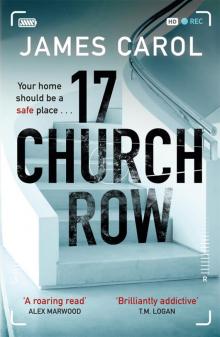 17 Church Row
17 Church Row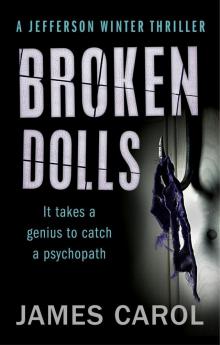 Broken Dolls (A Jefferson Winter Thriller)
Broken Dolls (A Jefferson Winter Thriller)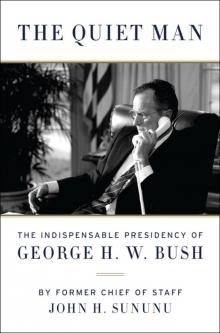 The Quiet Man
The Quiet Man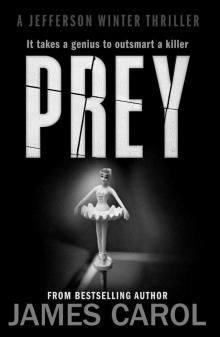 Prey (Jefferson Winter)
Prey (Jefferson Winter)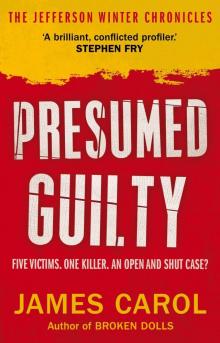 Presumed Guilty: (A Jefferson Winter novella)
Presumed Guilty: (A Jefferson Winter novella) Hush Little Baby
Hush Little Baby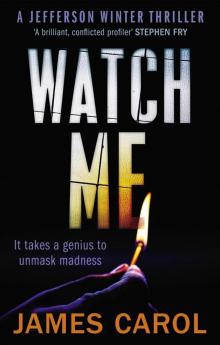 Watch Me (Jefferson Winter 2)
Watch Me (Jefferson Winter 2)